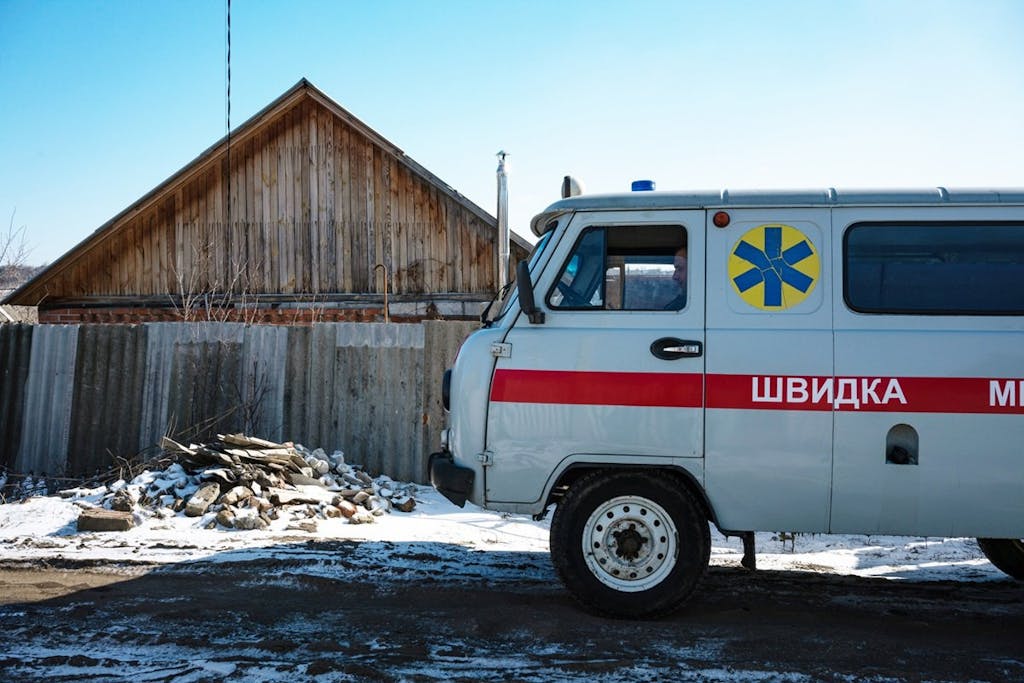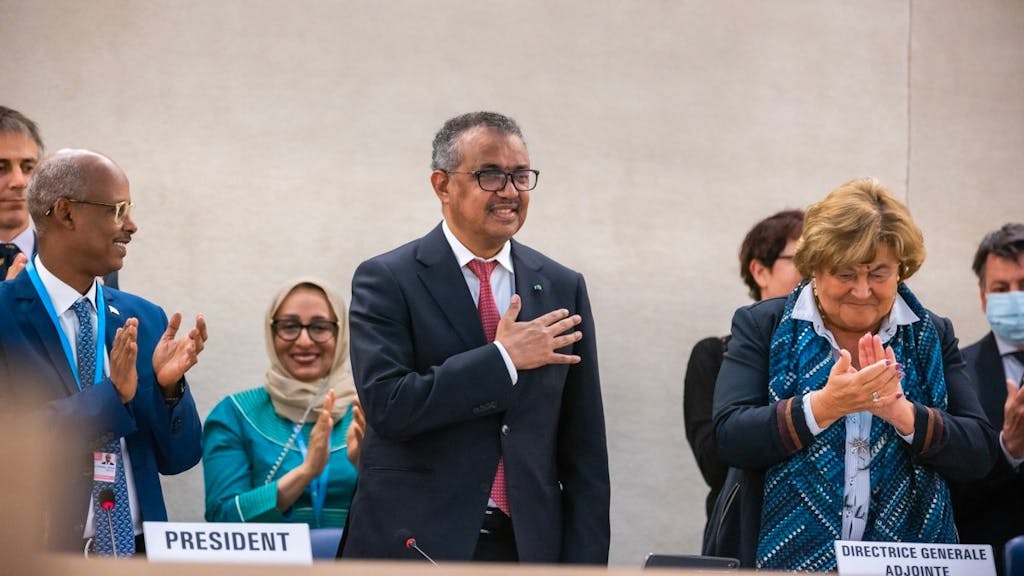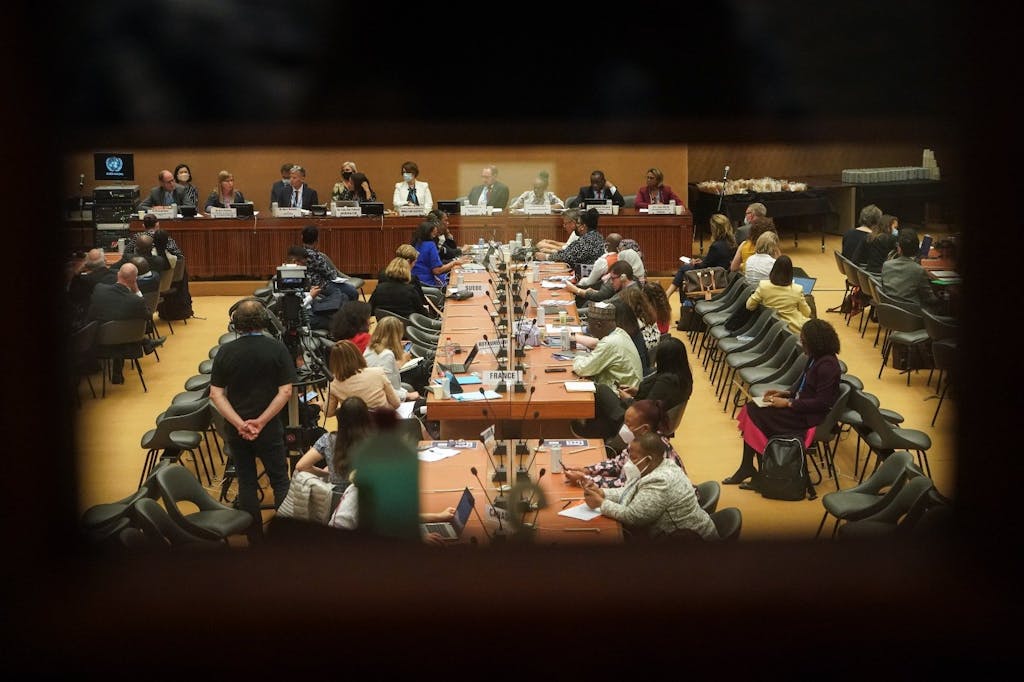For the first time since the COVID-19 pandemic began, Member State delegates, global health experts, and civil society representatives gathered in Geneva for the World Health Assembly. Breakthroughs on long-standing issues and urgent priorities — from fixing the organization’s broken financing to preparing for future health threats — marked the moment.
Health for Peace, Peace for Health
The consequences of conflict were top of mind at the 75th World Health Assembly (WHA75) as the war in Ukraine continues to take a devastating toll on the well-being of millions of people. In line with this year’s theme, Health for Peace and Peace for Health, the Assembly saw several pivotal moments related to health and conflict.
Of particular note, the Assembly voted on a resolution put forward by Ukraine condemning Russia’s military aggression against Ukraine, including attacks on health care facilities. The resolution also describes the aggression as fitting “exceptional circumstances” — meaning that the Assembly could potentially suspend Russia’s voting privileges and services. The resolution passed with 88 Member States voting in favor, while 12 voted against and 53 abstained. Russia put forth a similar resolution expressing concern for health conditions and attacks on civilians in Ukraine without naming an aggressor. That resolution failed.
Throughout the Assembly participants were reminded of the physical and mental health impacts of violence and conflict, which exacerbate existing vulnerabilities and plague communities in every corner of the world. Member States’ remarks highlighted that the global community is deeply concerned about the knock-on effects of conflicts, especially the spread of infectious disease, increasing climate vulnerabilities, and global food insecurity and malnutrition, to which the African continent is particularly susceptible.

A WHO-supported mobile mental health team vehicle is parked on the street during a home visit with former patient in Bylbasivka, Ukraine. The team travels to remote areas in the Donetsk region to deliver specialized mental health care to patients who do not have access. Photo: Blink Media - Brendan Hoffman/ WHO
European Regional Director Hans Kluge also underscored the vulnerability that women and children, especially girls, face in conflict-affected countries and assured Member States that the prevention of sexual exploitation, abuse, and harassment is at the center of the World Health Organization’s response in Ukraine and neighboring countries. Safeguarding measures, such as those outlined in the WHO Management Response Plan for preventing and responding to sexual exploitation and abuse, have been put in place and the region has appointed five focal points for different aspects of the response.
Reelection of the WHO Director-General
Running uncontested, WHO’s Director-General Dr. Tedros Adhanom Ghebreyesus was reelected to a second five-year term, which will conclude in August 2027. Dr. Tedros received 27 nominations from countries in all six WHO regions; typically, candidates receive just one nomination. In remarks after the election, Dr. Tedros expressed gratitude. “I’m really, really overwhelmed by your support and your trust. This recognition is not just for me. By and large, it is recognition for the whole WHO family … I want to appreciate … their hard work and focus on the issue of serving humanity,” he said.

Dr. Tedros Adhanom Ghebreyesus stands in gratitude immediately after Member States re-elected him to serve a second five-year term as Director-General of the WHO. Photo: WHO
Sustainable financing for WHO
The vexing issue of long-overdue reforms to WHO’s flawed financing structure was high on the WHA75 agenda. The advent of the COVID-19 pandemic forced Member States to reconcile their outsized expectations of the agency with their meager and highly conditional financial contributions. In a galvanizing moment on the first day of the Assembly, the UN Foundation delivered a letter signed by over 75 organizations and advocates around the world urging delegates to adopt measures to fix WHO’s broken financing model.
Member States stepped up during WHA75 in a historic decision to increase member dues, known as assessed contributions, to constitute 50% of WHO’s base budget by 2030-2031. Assessed contributions currently make up only 16% of the base budget, forcing the agency to operate with unpredictable and inflexible voluntary contributions.
Changing the financing structure is essential for WHO to recruit and retain top talent, increase funding flows to the country level, and ensure that budget allocations are based on scientific evidence and programmatic need. Pending future approval by Member States, the absolute dollar amount going to WHO through assessed contributions will increase by $600 million before 2030. More importantly, though, the decision taken at WHA75 will improve the conditions under which money flows to the organization.
Member States will also consider a replenishment model to finance the remainder of the base budget and to establish a Member State task team to oversee ongoing reforms to WHO’s transparency, efficiency, accountability, and compliance efforts.
Future work on preparedness for health emergencies
Since the earliest days of the COVID-19 pandemic, Member States, health organizations, and the general public have scrutinized the processes and regulations that govern global health responses to pandemics. The International Health Regulations (IHR), first negotiated in 1968 and most recently modified in 2005 in response to the H5N1 avian influenza, have been carefully examined by the Working Group on Strengthening WHO Preparedness and Response to Health Emergencies (WGPR). Though several amendments to the IHR have been proposed by Member States, only one amendment to Article 59, to shorten the time frame for future amendments to take effect, was considered for adoption at this year’s Assembly.

During this year’s World Health Assembly, strategic roundtables brought together delegates, experts from WHO, partner agencies and civil society to discuss current priorities and next solutions on vital global public health issues. Photo: L. Cipriani/ WHO
After much deliberation, the amendment, submitted by the United States, was adopted by consensus. The change will make the IHR a more agile legal instrument, indicating Member States’ commitment and building a strong foundation for the future efforts of a Member State-led Working Group on IHR, which will continue deliberating on changes to the regulations over the next two years.
While the Assembly officially closed on Saturday, May 28 the WHO Executive Board met on May 30 for its traditional post-WHA meeting. At the meeting, Member States agreed unanimously to establish a Standing Committee on Health Emergency (Pandemic) Prevention, Preparedness and Response. The panel will enhance oversight of WHO’s work in emergencies — regularly monitoring and assessing performance and helping ensure a faster, more efficient response when a Public Health Emergency of International Concern is declared.
What’s next?
After a packed weeklong agenda, WHA75 ended with clear wins — with a path forward for sustainably financing WHO chief among them. The meeting also paved the way for a nimbler response during international health emergencies and firmly recognized the health impacts of current conflicts on Ukraine, neighboring countries, and the world.
WHA75 delivered broad agreement that the world needs a stronger WHO and support for a better plan to manage health crises, plus an overwhelming vote of confidence for the Director-General. Now it’s up to global leaders to seize the moment, build on the progress, and deliver on the promise of health for all.









